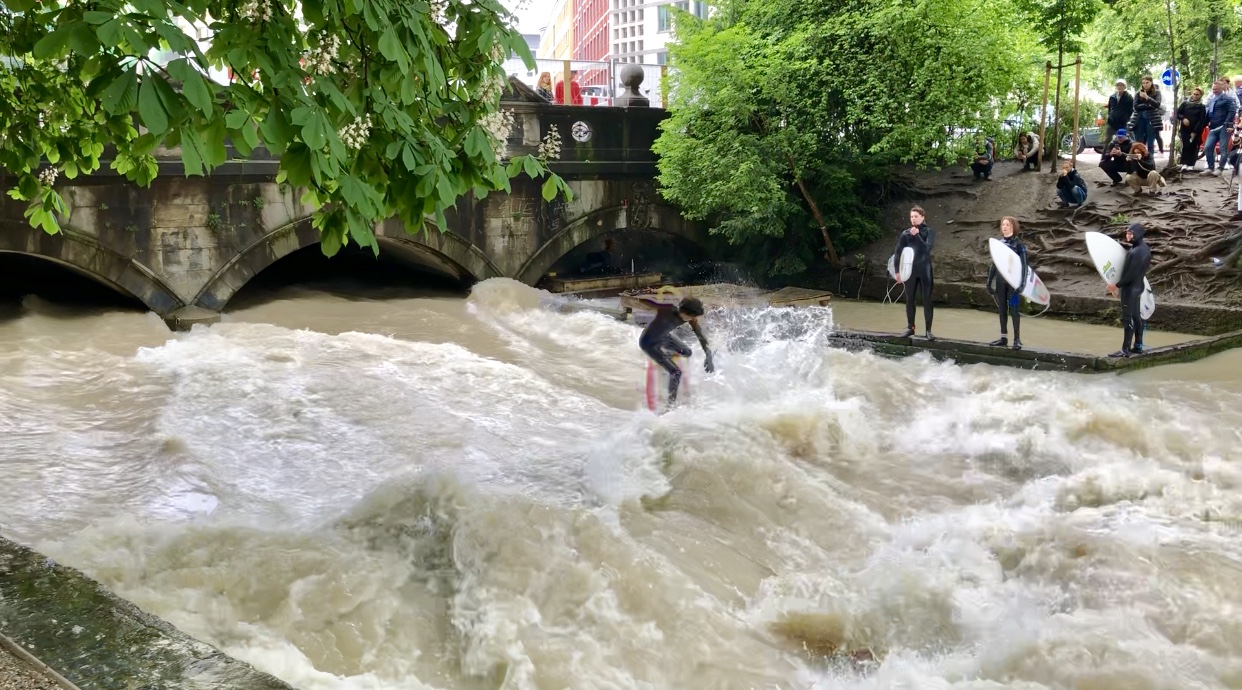The last thing you might think to see in the land-locked city of Munich, Germany is a haven for surfers. You’d be wrong. A true feat of German engineering, the manipulation of the Eisbachwelle turned this river into a perpetual, perfect surfing wave. Tourists make sure to stop at this top attraction on city tours to watch local surfers try their feet at river surfing. Whether they have experience in the ocean or not, this place is a popular destination for surfers of all backgrounds.
Why It’s Newsworthy: The man-made wave stands at about a foot and a half high and has created a culture for wave surfing in a city that is 310 miles from the coast and more than 680 miles from ocean breaks.
The View
Just off the Prinzregentenstraße Road, the Eisbach River meets the pavement at the Eisbachwelle. On each side of the river are huge, green trees that provide shade for surfers and bystanders. Far below the branches, dirt paths lead off to various parts of the English Gardens surrounding this area. A concrete walkway about three feet wide lines both banks of the river, providing an area to stand close to the rushing water as it surges through the bridge under the road.
People wear wetsuits, holding small boards designed for the river as they wait in line for their turn on the wave. The surfers throw their short boards, some rounded at the top and some pointed, in the water at their turn. They jump on their boards, carefully placing their feet on the grip, eager to show off to the crowds on either side.
As one surfer takes a turn, the others cheer, applaud, and even use their hands to beat their boards like a drum to show their approval. The surfers cut back and forth across the wave until they fall, submerging into the wave before they are swept down the river. After avoiding rocks and the concrete walls that contain the wave, they pop up about 20 feet downstream and swim to the edge to wait their turn again.
From the Beginning
Eisbachwelle.de calls Munich “the river surfing capital of the world”. This new style of surfing began where the Eisbach’s water flows from the Isar River. In the 1970s, German engineers saw the dangerous rush of the water and tried to slow the flow of the river by submerging concrete blocks near the bridge. They realized that only created more of a rapid. While surfing on the rapid was entirely possible, it could only be done when there was enough water flow.
Surfers then took it into their own hands to submerge boards and tie them to the bottom of the river so they could be adjusted or removed according to the speed and flow of the water. Alex Klier, 50, is a local from Munich who began surfing here three months ago. He explains the manipulation of the wave, saying, “[wooden planks and surfboards are] in the water so the wave can be really smooth, but sometimes we need to take [them] out and put [them] over by the water.”
Comparison
The main differences between surfing in the ocean and in the river are the smaller width of the surfing area and the ever-changing conditions of the water. On some days, the rush of the water is faster than normal, making the wave rougher.
Whether it’s warm in the middle of the summer or snowing in the dead of winter, there is always a crowd at the Eisbachwell, and Klier says that even the time of day is unimportant. Most of the surfers go whenever they have time. “I have a light and I go in the evening and at night, or even in the morning at five am.” This devotion to the sport is what has allowed it to gain such popularity worldwide. It has given Munich residents a chance to pick up or continue their love for surfing at home and has even influenced professional surfing.
Alex Awad is a second year majoring in public relations in the Grady College of Journalism and Mass Communications at the University of Georgia.








